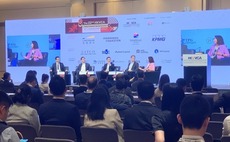
Secondaries: Sleight of hand

Are LPs using synthetic solutions like total return swaps to trade fund positions behind the managers’ backs? Some industry participants are suspicious; others are skeptical.
"You had quite a lot of power 10 years ago," one Asian GP says in reference to secondary sales of LP interests in funds. "Nowadays I suspect there are synthetic ways that people can run around these approval matters. It's a bit like a contract-for-difference versus owning equities. ‘I am going to give you this money, I'm not buying the underlying unit, but at the end of the day there will some kind of calculation that will allocate me the capital gain.'"
It is a bleak perspective and one that the GP in question is unable to take beyond conjecture: If synthetic wraps are being used to transfer LP holdings without the requisite GP approval, the underlying manager would be the last to know.
Nevertheless, the debate represents an interesting take on GP-LP relations in the context of changes in investor makeup.
Secondaries are increasingly accepted as part of the private equity industry on a global basis - Lexington Partners estimates that deal flow will reach $30 billion in 2013, nearly double the 2008 figure - and as transactions become more commonplace they also become more sophisticated. This includes the use of total return swaps, the structure usually associated with passing the profits from an LP interest to a third party without any change in the ownership of the interest itself.
In a nascent market like Asia, where GPs' experience of secondaries ranges from comprehensive to non-existent, transactions might be simpler but they are more challenging in other respects. It isn't unknown for managers to refuse to sign off on transfers or try to exert an undue level of influence on the process.
"There are GPs in Asia that, if they find out somebody is selling, are not going to be very happy about it," says Doug Coulter, a Hong Kong-based partner with LGT Capital Partners. "But for most what matters is who is selling and who is buying. If it means upgrading the LP base - by getting a longer-term investor, a different kind of investor or an investor from a different geography - the GP could see it as a good thing."
Faced with an unyielding manager, it could be argued that total return swap is a useful means of resolving the transfer issue. Industry participants say these structures are a rarity in Asia, but LGT did come across one earlier this year.
An investor was buying a package of assets - one fund investment plus several direct investments - from an investment bank with an office in Asia. The seller received a consideration for the fund, but as far as the manager was concerned, there was no change in the LP. LGT acquired the fund interest from the investor, after the bank transaction was completed.
However, a total return swap isn't necessarily used because a GP is being uncooperative: anonymity might benefit the seller because they don't want the manager to know about the sale for other commercial reasons, or perhaps they don't want information trickling through the intermediary network to rival investors.
"Sometimes the seller still wants the relationship so they are the name on the door," says Tim Flower, a principal at HarbourVest Partners in Hong Kong. "They might want to retain the GP's corporate finance business but don't want the fund interest. It's not a common occurrence but it does happen."
Another - even more hypothetical - explanation is that an overseas investor wants to acquire an LP position in a renminbi-denominated fund from a local player. Should the regulator find out about the transfer, the fund could lose the benefits available to domestic vehicles, such as access to sensitive sectors and speedy approvals, because the presence of the overseas investors means it is designated foreign.
Practical implications
Hypothetical scenarios aside, Hiro Mizuno, a partner at secondaries specialist Coller Capital, is skeptical about the size of the role total return swaps can play in private equity simply because the industry isn't ready for them.
"I was one of the first people in New York to do a total return swap with loans and at the time there was a big challenge because we had no standardized documentation," he says. "Some transactions in private equity use this technique but they are very difficult to create with PE assets for exactly the same reason. For total return swaps to become mainstream, you need standardized documentation."
Secondaries investors are not opposed to total return swaps - they provide deal flow - but there is also the issue of whether these structures are really necessary. In the vast majority of cases the LP would prefer to sell a fund interest with the GP's consent, rather than expose itself to the costs and structuring and counterparty risks that come with a total return swap.
And even in Asia, GPs are accepting that secondaries are more accepted. On the one hand, a manager who exercises a veto over a transfer is morally obliged to offer an alternative buyer and this can be time-consuming unless candidates are already standing by. On the other hand, a GP might see the benefit of allowing secondary deal flow, almost regardless of the buyer.
"Investors enter a fund knowing it is going to be illiquid but they still think it's not gong to be totally illiquid," says Mizuno. "The presence of secondary buyers encourages LPs to commit to private equity and GPs now realize this."
Latest News
Asian GPs slow implementation of ESG policies - survey
Asia-based private equity firms are assigning more dedicated resources to environment, social, and governance (ESG) programmes, but policy changes have slowed in the past 12 months, in part due to concerns raised internally and by LPs, according to a...
Singapore fintech start-up LXA gets $10m seed round
New Enterprise Associates (NEA) has led a USD 10m seed round for Singapore’s LXA, a financial technology start-up launched by a former Asia senior executive at The Blackstone Group.
India's InCred announces $60m round, claims unicorn status
Indian non-bank lender InCred Financial Services said it has received INR 5bn (USD 60m) at a valuation of at least USD 1bn from unnamed investors including “a global private equity fund.”
Insight leads $50m round for Australia's Roller
Insight Partners has led a USD 50m round for Australia’s Roller, a venue management software provider specializing in family fun parks.







